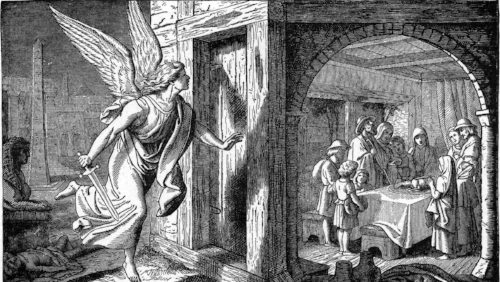The Bible is an ancient text filled with stories that, on first (or second, or third) pass can seem very nasty, brutish, and short. But there is generally an underlying morality that makes perfect sense in an Ancient Near East context, and can still be applied today. Like “do what God tells you” and “don’t be a hypocrite!”
Trampling the Heads of the Poor into the Dust & Denying Justice to the Oppressed (Amos 2:7a) [A Card Talk on the Book of Amos]
Here we present some historical and textual context to from the book of Amos, and see it's message of social justice still (sadly) applies in the present. We ask what fire will fall in our lives if the acts of inhumanity to man continue to be perpetrated not just out there, but in here, within the community, within the household of faith?
Death by Lion for not Punching a Prophet (1 Kings 20:35-36) [A Guest Card Talk]
Playing the whore with many lovers on top of every high hill and under every green tree (Jeremiah 2:20)
We had a long post planned for this one: a carefully articulated, poetically worded, Scripture laden treatise to prove a central point; but allow us state it crassly, boldly: Take your complaints about patriarchal language and shove them for a moment and realize that God loves you, loves us, love the Jews of Jeremiah's day, and was hurt by their actions against Him, our actions again Him, your actions. Mine.
Jeremiah paints God as a hurt lover, like Hosea, Isaiah, and Ezekiel did before him. That is the heart of the text.
Have you ever been cheated on? Have you had someone you cared for rip your heart out, when all you ever did was love them as best you could? Have you ever asked them "why" and got a shrug in return? Have you desired to take them back when you know the outcome will leave you in tears again?
There were so many things we were going to say, rephrasing, rehashing, recapturing the anguish Jeremiah and the other prophets cull from the heart of God, but instead we give you these words from Martin Sexton's "Where Did I Go Wrong?" [Maybe read them alongside the second chapter of Jeremiah in itself entirety, where God laments a lost love, saying "you were My lovely bride, you used to love Me? What happened? I gave you everything, but you left Me for another who treats you horribly. Why?"]
Where did I go wrong with you?
Where did I go wrong?
Was it something I said or did or didn't do?
Was all I had not enough for you?
All the life we were burning through
What with your memory shall I do?
I opened up the deepest of my inside
It was all I had left to give to you.
Where did I go wrong with you?
Perhaps ... no. No perhaps. God loves us and we act like unfaithful spouses.
And you probably think we're going to Hell for making this game, but you know we're right.



![O Come, O Come Emmanuel (Isaiah 7:14) [An Advent Card Talk]](https://images.squarespace-cdn.com/content/v1/55a9a1e3e4b069b20edab1b0/1483161046976-X5VJE3CMP9T957O72EII/3d-wallpapers-light-dark-wallpaper-35822.jpg)


![Trampling the Heads of the Poor into the Dust & Denying Justice to the Oppressed (Amos 2:7a) [A Card Talk on the Book of Amos]](https://images.squarespace-cdn.com/content/v1/55a9a1e3e4b069b20edab1b0/1498320217004-77V0OAC1GLUZKQALM1XL/blue_bra_01_custom-bd460798b934a1dc88306e282cd53086bc462d81-s800-c85.jpg)
![Death by Lion for not Punching a Prophet (1 Kings 20:35-36) [A Guest Card Talk]](https://images.squarespace-cdn.com/content/v1/55a9a1e3e4b069b20edab1b0/1498745366233-OVZPD5RJCWR6C3MUX8VM/animal-1851658_960_720.jpg)